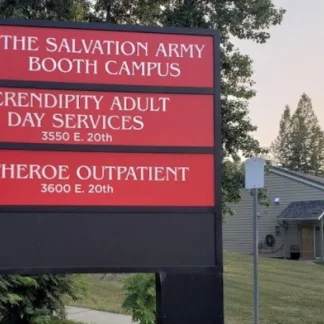North Star DeBarr Hospital
Northstar Debarr Hospital, located in Anchorage, Alaska, provides mental health ...
Salvation Army - Clitheroe Center provides alcohol and drug rehab treatment to men and women seeking recovery in Anchorage, Alaska. They also provide mental health treatment and dual diagnosis treatment. No one is turned away due to lack of funds.
Salvation Army – Clitheroe Center begins all treatment services with an on-site assessment to determine the appropriate level of care. Their programs include residential and outpatient treatment.
Residential Treatment The residential program is a 42-bed campus that provides treatment in a gender-specific format. They specialize in the treatment of dual diagnosis. Individual therapy, group therapy, and evidence-based treatment interventions are provided.
Outpatient Treatment The outpatient program can be used as a continuing care program upon completing the inpatient program. Clients participate in mental health counseling and continue to treat their addictive tendencies.
Private Insurance Salvation Army – Clitheroe Center aims to support individuals regardless of their financial means. If an individual is interested in using insurance for any type of mental health treatment, it is important to verify coverage with the insurance provider. This is because out of network benefits may vary.
Contact us for more information: (907) 279-0522

Connect with Salvation Army - Clitheroe Center by calling their admissions team directly.
(907) 279-0522 Website Get DirectionsThe Commission on Accreditation of Rehabilitation Facilities (CARF) is a non-profit organization that specifically accredits rehab organizations. Founded in 1966, CARF's, mission is to help service providers like rehab facilities maintain high standards of care.
CARF Accreditation: Yes Accreditation Number: 20686
Research clearly demonstrates that recovery is far more successful and sustainable when loved ones like family members participate in rehab and substance abuse treatment. Genetic factors may be at play when it comes to drug and alcohol addiction, as well as mental health issues. Family dynamics often play a critical role in addiction triggers, and if properly educated, family members can be a strong source of support when it comes to rehabilitation.
Group therapy is any therapeutic work that happens in a group (not one-on-one). There are a number of different group therapy modalities, including support groups, experiential therapy, psycho-education, and more. Group therapy involves treatment as well as processing interaction between group members.
In individual therapy, a patient meets one-on-one with a trained psychologist or counselor. Therapy is a pivotal part of effective substance abuse treatment, as it often covers root causes of addiction, including challenges faced by the patient in their social, family, and work/school life.
Group therapy is any therapeutic work that happens in a group (not one-on-one). There are a number of different group therapy modalities, including support groups, experiential therapy, psycho-education, and more. Group therapy involves treatment as well as processing interaction between group members.
In individual therapy, a patient meets one-on-one with a trained psychologist or counselor. Therapy is a pivotal part of effective substance abuse treatment, as it often covers root causes of addiction, including challenges faced by the patient in their social, family, and work/school life.
In individual therapy, a patient meets one-on-one with a trained psychologist or counselor. Therapy is a pivotal part of effective substance abuse treatment, as it often covers root causes of addiction, including challenges faced by the patient in their social, family, and work/school life.
Northstar Debarr Hospital, located in Anchorage, Alaska, provides mental health ...
AK Child and Family - Jesse Lee Campus provides alcohol and drug rehab treatment...
Jett Morgan Treatment Services offers outpatient services for individuals with a...
Day Break, located in Anchorage, Alaska, provides several outpatient community m...